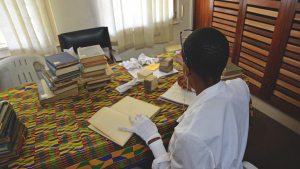Even though my summer will be spent working at two internships, I have been learning a thing or two. Thank you to Dr. Michael Williams and Dr. Audrey Gadzepko.


Here’s a brief summary of what I’ve learned about media in Ghana:
Great journalism usually goes unnoticed. Bad journalism (unethical or biased coverage of stories) is usually noticed. This leads to the assumption that journalists and the media in general suck. People are quick to generalize based upon the negative. Most don’t even realize the impact of media on the growth of a country.
The media has played an important role in shaping the country of Ghana, especially in its democratization and ultimately its independence. Ghana used to be colonized by the British in the 1800s, and this is where the influence of media first began.
Around the time of World War II, the radio and newspaper became more widely accessed and distributed. Then Kwame Nkrumah, who believed in the power of media, became Prime Minister of the Gold Coast in 1951. Political figures put their slogans in newspapers for them to become slogans in the streets. The government used the media as an instrument to connect with the people of Ghana. For example, journalists were seen as part of the regime during military takeovers.
In 1957, Ghana gained independence – making it the first sub-Saharan country to gain independence. However, it wasn’t until 1991 that journalists had to get a license before publishing.
Shirley Graham Dubois, the wife of W.E.B. Du Bois, created the first television network in Ghana. She believed in the power of journalism. Aside from the media in Ghana, W.E.B. Du Bois played an important role in the growth of Ghana. He is often referred to as the “Father of Pan-Africa.” As a sociologist, civil rights activist and Pan-Africanist, he advocated for the acknowledgement of African roots, education and of the African culture, development of African countries and a united Africa. He believed that every African-American has a responsibility to Africa and looked at African people collectively, in terms of a common history, experience, etc.
In 1961, W.E.B. Du Bois visited Ghana for the first time after being invited by Prime Minister Kwame Nkrumah. This is where he stayed for the remainder of his life, and he worked with scholars on the Encyclopedia Africana. Du Bois influenced men like Dr. Martin Luther King, Jr. and the civil rights movement in America. One day following Du Bois’ death, the March on Washington took place. His wife Shirley carried on his legacy and made a mark of her own in both Ghana and America. I even had the pleasure of visiting his historical home where he passed away.
In November 1992, Ghana was finally democratized.
I love learning about Ghanaian history as I immerse myself in this culture each day. What I have learned is that nowadays the majority of Ghanaians firmly believe they have the freedom of speech, expression and press. Additionally, they believe that the media does a good job of revealing government corruption. There isn’t as much governmental control over what gets published in the media, which shows the progress of media in Ghana. There are currently over 300 radio stations in Ghana and about 40 are in Accra. Radio is the most widely accessed media platform in Ghana. The radio station that I have the honor of interning at was one of the first radio stations.
As technology slowly integrates itself into the Ghanaian culture, there is an increasing pressure on traditional media (print journalism, etc.). Ghanaians who have access to social media love it just as much as Americans do. Despite the crazier driving (which I will write about), I have noticed texting and driving is just as common here. It is not unusual to see a Ghanaian glued to their smartphone, if they have one, just like Americans. I love noticing all these similarities and differences in our uses of technology.



